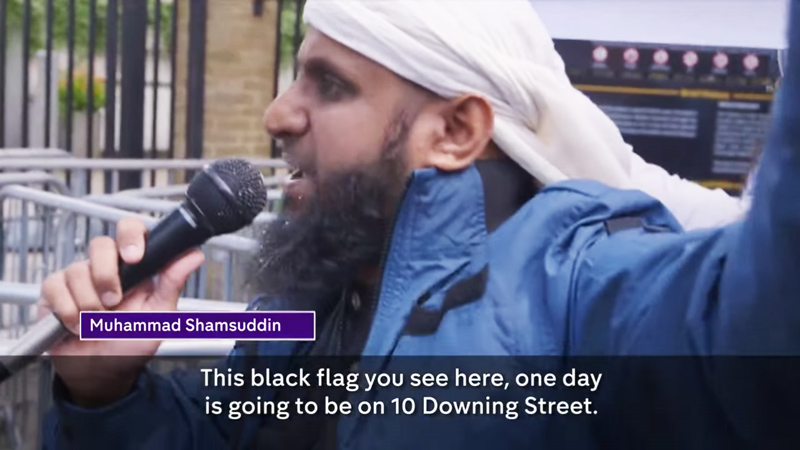Four years ago, the British liberal newspaper, The Guardian, ran a story about the “survivors of Guantanamo“, the “victims of America’s ‘icon of lawlessness'”, “Britain’s survivors of the detention centre that has been called the ‘gulag of our times'”. The article featured a photograph of Jamal al Harith.
Al Harith, born Ronald Fiddler, a Christian convert to Islam, returned to Manchester from detention at Guantanamo Bay thanks to activism of David Blunkett, Home Secretary of then-Prime Minister Tony Blair. Al Harith was immediately welcomed in England as a hero, the innocent victim of the unjust “war on terror” after September 11. The Mirror and ITV gave him £60,000 ($73,000) for an exclusive interview about his experience at Guantanamo. Al Harith was also compensated with one million pounds by the British authorities. The victim of the “gulag of our times” bought a very nice house with the taxpayers’ cash.
A few weeks ago, al Harith made his last “journey”: he was blown up in Mosul, Iraq, on behalf of the Islamic State. Al Harith had also been recruited by the non-governmental organization “CAGE” (formerly known as “Cageprisoners”) as part of its testimony advocating the closure of the Guantanamo Bay detention facility.
Celebrities such as Vanessa Redgrave, Victoria Brittain, Peter Oborne and Sadiq Khan appeared at CAGE’s fundraising events. The NGO has been funded by the Joseph Rowntree Trust, a fund created by the chocolate magnate, and by the Roddick Foundation, the charity of Anita Roddick. Al Harith was also invited to the Council of Europe, to give testimony against retaining Guantanamo.
Al Harith’s story reveals the depth of one of Europe’s biggest scandals: the jihadis’ use of European cradle-to-grave entitlements to fund their “holy war”. Europe gave them everything: jobs, homes, public assistance, unemployment benefits, relief payments, child benefits, disability payments, cash support. These Muslim extremists, however, do not see this “Dependistan”, as Mark Steyn called the welfare state, as a sign of generosity, but of weakness. They understand that Europe is ready to be destroyed. They have no respect for it. From Marseille to Malmö, many Muslim children have been raised to despise the societies that have made them so comfortable. Most Islamists in Europe are now living on support payments from the nations they had vowed to destroy.
A few days ago, the Danish press revealed that the Danish government has been paying sickness and disability benefits to Muslim extremists fighting in Syria for the Islamic State. “It is a huge scandal that we disburse money from the welfare fund in Denmark for people who go to Syria,” said Employment Minister Troels Lund Poulsen. The terrorists who struck Paris and Brussels have also used the generous British welfare system to fund their jihad. It is emerging from a trial in the UK that Mohamed Abrini, known as “the man with the hat” after the deadly attack at Brussels airport, received £3,000 in benefits before flying to Paris and disappearing.
It is not the first time that the role of the welfare state emerges in the Islamic infrastructure of terror:
- The family of Omar Abdel Hamid el Hussein, the terrorist behind the attack in Copenhagen in February 2015, which killed two people, received money from Danish social programs.
- British Islamist Anjem Choudary, convicted of encouraging people to join the Islamic State, urged the faithful to leave work and to seek unemployment benefits to devote full-time to war against the “infidels”. Choudary himself pocketed £25,000 a year in benefits.
- In Germany, when the newspaper Bild ran an analysis of the 450 German jihadists fighting in Syria, it found that more than 20% of them have received benefits from the German state.
- In the Netherlands, a jihadist named Khalid Abdurahman appeared in a video of the Islamic State in front of five heads just cut off. The Dutch newspaper Volkskrant revealed that he had been declared “unfit for work” and was paid for a treatment of claustrophobia.
Europe’s welfare system has created a cultural toxin for many in a sullen, unproductive Muslim underclass who live in the segregated enclaves such as the banlieues of Paris or “Londonistan”. Filled with religious certainty and ideological hatred for the West, not required to assimilate to Europe’s values and norms, certain of these European Muslims seem to feel as if they are destined to devour an exhausted civilization.

Muhammad Shamsuddin, a 39-year-old London-based Islamist, was featured in a documentary called “The Jihadis Next Door.” Shamsuddin, a divorced father of five who lives on state handouts and claims he cannot work because he has “chronic fatigue syndrome,” was filmed preaching hate against non-Muslims on British streets. (Image source: Channel 4 video screenshot) |
Public policy goals instead need to be to move people off welfare — shown to be basically a disincentive to looking for work — except in extraordinary cases, and toward personal responsibility. There need to be legal limits on the uses to which welfare funds can be put — for example, welfare funds should not to be used for purchasing illegal drugs, for gambling, for terrorism or, as there is no free speech in Europe anyway, for promoting terrorism. One could create and fine-tune such a list. Disregarding the limitations could result in losing the benefits. Measures such as that would will help fight against the ghettoization and Islamization of Europe’s Muslims.
Who is winning here? Democracy or Islamic extremism? The cycle of welfare and jihad needs to be stopped. Now.
Giulio Meotti, Cultural Editor for Il Foglio, is an Italian journalist and author.

























